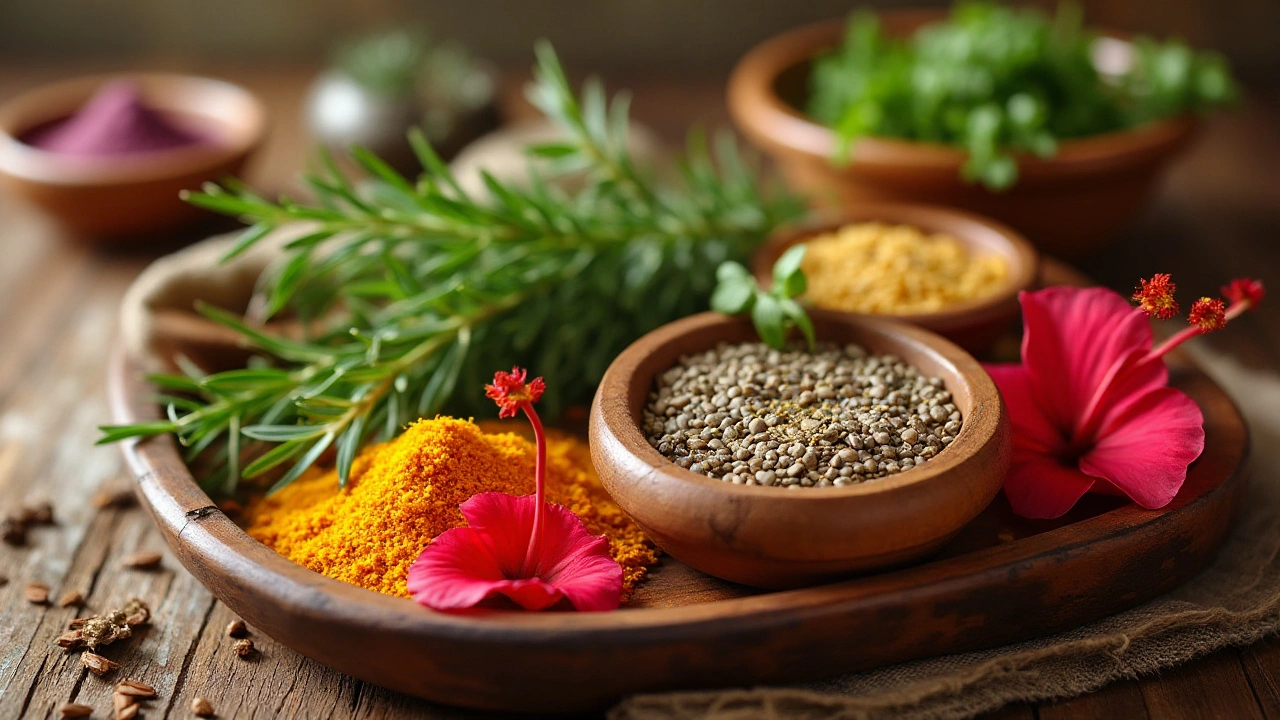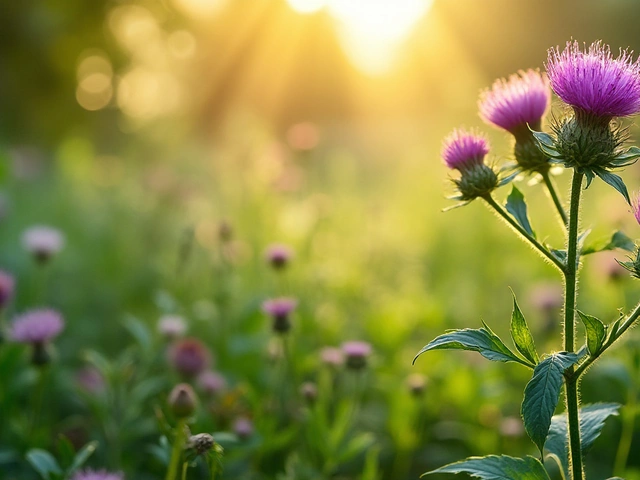
Grey hair is a natural part of aging, but for those who wish to maintain their youthful locks, Ayurveda provides a treasure trove of solutions. This ancient practice views hair health as a reflection of the body's internal balance. By tapping into the wisdom of Ayurveda, it's possible to explore methods that might reverse the greying process and promote a vibrant look.
The journey to addressing grey hair through Ayurveda involves a holistic approach that includes understanding the underlying causes, adopting suitable dietary choices, and incorporating specific herbs into one's daily routine. From traditional concoctions to modern-day interpretations, Ayurveda offers a range of strategies to enhance hair vitality naturally.
- Understanding Grey Hair in Ayurveda
- Diet and Lifestyle Changes for Hair Health
- Herbs that Help Reverse Grey Hair
- Practical Ayurvedic Hair Care Tips
Understanding Grey Hair in Ayurveda
Ayurveda offers a unique perspective on the graying of hair, viewing it not merely as a sign of aging but as an indication of imbalances within the body. According to Ayurvedic principles, the health of your hair is intricately linked with the equilibrium of the body's doshas—Vata, Pitta, and Kapha. When these doshas are balanced, hair thrives; when they're out of balance, it may lead to premature greying. To understand grey hair, Ayurveda emphasizes the role of Pitta dosha, which governs metabolism and transformation. Excessive heat and acidity in the body, often tied to an aggravated Pitta, can affect melanin— the pigment responsible for hair color, leading to greying.
In the Ayurvedic tradition, greying is also associated with deeper issues such as stress, poor digestion, and nutrient deficiencies. An individual prone to excessive thinking and stress, a common trait of Vata imbalance, might see a quicker onset of grey hair. Stress has a profound impact on our bodies, pushing them out of a natural rhythm that is essential for maintaining hair color. Similarly, digestive fire, or Agni, is a vital component in Ayurveda. A sluggish digestive system may not absorb essential nutrients effectively, undermining hair health and potentially accelerating the graying process.
For many, this ancient perspective not only attributes greying to bodily dynamics but also implicates modern lifestyle factors. Diet plays a significant role. The consumption of too many fiery, spicy foods exacerbates Pitta, leading to hair issues. Ayurveda suggests a balanced diet tailored to one’s dominant dosha can aid in managing hair health. Emphasizing foods that nourish the scalp and hair follicles can maintain their color longer. Stress management through meditation and yoga further lends itself to maintaining a proper dosha balance, crucial for keeping grey strands at bay.
One aspect that stands out in Ayurveda is the belief that hair care extends beyond physical treatments to mental and emotional well-being. The Ayurvedic texts often highlight how fostering a healthy emotional environment promotes overall body health, reflecting in the hair. Engaging in deep breathing exercises or indulging in calming activities can be steps toward a more holistic approach to combating grey hair. It is intriguing how these ancient practices align with modern understanding, advocating for a lifestyle that is harmonious with nature.
"Our hairs are a reflection of our health," suggests the Charaka Samhita, a foundational Ayurvedic text. It emphasizes that when we care for our body and mind, the visible signs, like our hair, flourish.
Such profound insights provide cues for those seeking natural remedies for grey hair. Recognizing these factors presents a comprehensive picture of how Ayurveda seeks to understand and remedy greying. It’s not just about reversing the existing grey strands but developing an awareness of one’s lifestyle and embracing changes that encourage harmony inside out. This holistic view separates Ayurveda from other hair care approaches, inviting individuals to explore a deeper, more enriched journey toward wellness and vitality.

Diet and Lifestyle Changes for Hair Health
The state of our hair often mirrors the state of our health, and in Ayurvedic tradition, this connection runs deep. By adopting specific diet and lifestyle changes, we can positively impact our hair's vibrancy and potentially reverse grey hair. A nourishing diet, rich in essential vitamins and minerals, is crucial for maintaining natural hair color. Foods that are particularly beneficial include dark, leafy greens like spinach and kale, which are rich in Vitamin B-complex, iron, and other nutrients that nurture hair follicles. Including a variety of whole grains, nuts, and seeds in your diet can also supply the much-needed zinc and copper, often linked to maintaining hair's natural pigment.
In addition to eating right, it's essential to lead a balanced lifestyle. Stress, which has become a ubiquitous part of modern living, is known to exacerbate hair greying. Ayurveda emphasizes the importance of incorporating routine practices like yoga or meditation to manage stress levels and promote hair health. Regular exercise not only reduces stress but also promotes blood circulation, ensuring your scalp receives the nutrients it needs. A well-rested body heals better and faster, so prioritizing good sleep rituals can also play a role in preventing premature hair greying.
Embracing Ayurvedic Principles
Ayurvedic philosophy encourages us to live in harmony with nature and our own rhythms. This approach can be beneficial when addressing hair health. Seasonal changes can affect hair condition, and so adjusting one's diet according to the seasons can prevent further damage. For instance, consuming cooling foods such as cucumber and melons in the hot months can help maintain the body's equilibrium. Additionally, maintaining good hydration by drinking plenty of water and herbal teas is fundamental for keeping both hair and scalp healthy. As one Ayurvedic practitioner once noted, "True beauty comes from within, and nourishing the body is key to maintaining it," encapsulating the holistic philosophy of the practice.
To further enhance the impact of dietary choices, it's helpful to include certain Ayurvedic herbs and spices regularly. Incorporating amla, also known as Indian gooseberry, is a time-honored practice for hair care. Rich in Vitamin C and antioxidants, amla can be consumed as a juice, powder, or in capsule form, supporting overall hair health and possibly restoring natural color. Likewise, turmeric, known for its antioxidant properties, can be included in your daily meals to prevent oxidative stress, which is another factor in premature greying. By integrating these practices, one can create a supportive environment for hair rejuvenation and vitality.

Herbs that Help Reverse Grey Hair
Among the revered tools of Ayurvedic medicine are the potent herbs known for their capacity to reverse grey hair. These natural wonders have been cherished in India for thousands of years, promising to restore color and vitality to fading locks. One of the most renowned is Amla, or Indian gooseberry, which is celebrated not only for its rich vitamin C content but also for its reputation as a superfood for hair. Amla is said to strengthen hair follicles, promote luscious growth, and help prevent premature greying. By consuming it in powder form or as fresh juice and applying it directly to the scalp as an oil, this herb works from the inside out to bring a youthful shimmer back to hair.
Another key player is Bhringraj, known in Ayurveda as the 'king of herbs' for hair care. This humble leaf is often transformed into a soothing oil that nourishes the scalp and potentially reverses the greying process. It’s believed to improve blood circulation in the scalp, which is crucial for hair pigmentation. Using Bhringraj regularly, either as a supplement or topically, can foster stronger, darker hair. According to a recent study published in the "Journal of Ayurveda and Integrative Medicine", these traditional methods are garnering interest even in modern research circles, offering promise for both researchers and individuals embracing natural remedies.
Shikakai and its Complementary Effects
Shikakai, meaning 'fruit for hair', complements the effects of Amla and Bhringraj by providing a natural cleanser that doesn't strip the hair of its natural oils. Instead, it gently nurtures hair health, allowing other herbs to penetrate more effectively. For individuals looking to incorporate these elements into their routine, creating a paste with Shikakai powder, amla, and bhringraj can elevate daily hair care. Anjali, my wife, once mentioned how making a simple herbal concoction helped her see visible improvements in hair texture, emphasizing the importance of consistency in utilizing these herbs. Such firsthand experiences reflect the profound, yet humble, impact of Ayurveda.
To embrace Ayurveda fully, one can try an Ayurvedic approach with herbs, integrating them into both diet and topical treatments. Many online Ayurvedic communities share their recipe variations for homemade remedies, ensuring that anyone, anywhere, can tap into these ancient secrets. While science continues to dissect and analyze the myriad benefits of these herbs, countless individuals across the globe already advocate for their efficacy based on personal success stories. The careful combination of these natural remedies may hold the key to unlocking that long-desired reversal of grey hair.

Practical Ayurvedic Hair Care Tips
Delving into the world of Ayurveda reveals a rainbow of techniques tailored to nurture and reverse the journey of grey hair. As Ayurveda emphasizes harmony between body, mind, and spirit, its approach to hair care is just as holistic. At the core of Ayurvedic hair care lies the rejuvenation of the body's internal processes while putting to use some of the most effective natural remedies. A diligent routine that balances diet, lifestyle, and herbal applications can lead to remarkable results over time.
One of the key practices is the regular oiling of the scalp using Ayurvedic oils like bhringraj, amla, and coconut oil. Massaging these oils into the scalp promotes blood circulation, which in turn nourishes hair follicles. A warm oil massage not only soothes and relaxes but also encourages deeper penetration of vital nutrients. As often quoted by Jamuna Devi, a renowned Ayurvedic practitioner, "Consistent oiling can transform the hair health. It's nature's own conditioner." Bhringraj is hailed as the 'king of herbs' for hair because of its medicinal properties that reduce hair greying and loss. Users often notice a significant reduction in greying with regular application.
Another practice integral to Ayurvedic hair care is the use of herbal pastes and masks. An amla powder mask mixed with water or yogurt is not only cooling but is rich in Vitamin C, an essential nutrient for melanin production in hair. Applying this mask twice a week can boost hair health and restore natural color. Henna, although more popular for coloring, also conditions the hair deeply and strengthens the roots. When combined with amla, it can significantly enhance the hair’s natural pigmentation. Such applications embody Ayurveda's belief in placing trust in nature to bring out its best in natural health remedies.
Diet plays a crucial role too. Ayurveda suggests consuming black sesame seeds and curry leaves to maintain the hair's pigmentation. These seeds are known to be rich in essential fatty acids and trace minerals. An Ayurvedic diet that includes leafy greens, nuts, and seeds helps balance the body's doshas, particularly Vata and Pitta, which, when imbalanced, are seen as causes for premature greying. Hair care doesn't end with topical treatments but involves nourishing the body with essential nutrients to positively influence hair growth.
Practicing yogic breathing exercises such as pranayama can aid in stress reduction, which Ayurveda identifies as another catalyst for premature greying. Regular yoga sessions improve blood flow, which is vital for maintaining a healthy scalp and hair. Meditation, as part of a daily routine, helps maintain hormonal balance, indirectly influencing pigmentation longevity. The power of a calm mind shouldn't be underestimated when considering natural remedies for better hair health.
Lastly, mindfulness in lifestyle choices can make a difference. Shampoos with harsh chemicals should be swapped for natural alternatives like reetha and shikakai, which cleanse without stripping the scalp of essential oils. While embracing beneficial habits, awareness of negative influences, including excessive heat from styling tools, helps pave the way for hair vitality. Allowing your hair to dry naturally and opting for protective hairstyles can reduce breakage and stress on the hair shafts.





Rohan Talvani
I am a manufacturing expert with over 15 years of experience in streamlining production processes and enhancing operational efficiency. My work often takes me into the technical nitty-gritty of production, but I have a keen interest in writing about medicine in India—an intersection of tradition and modern practices that captivates me. I strive to incorporate innovative approaches in everything I do, whether in my professional role or as an author. My passion for writing about health topics stems from a strong belief in knowledge sharing and its potential to bring about positive changes.
view all postsWrite a comment